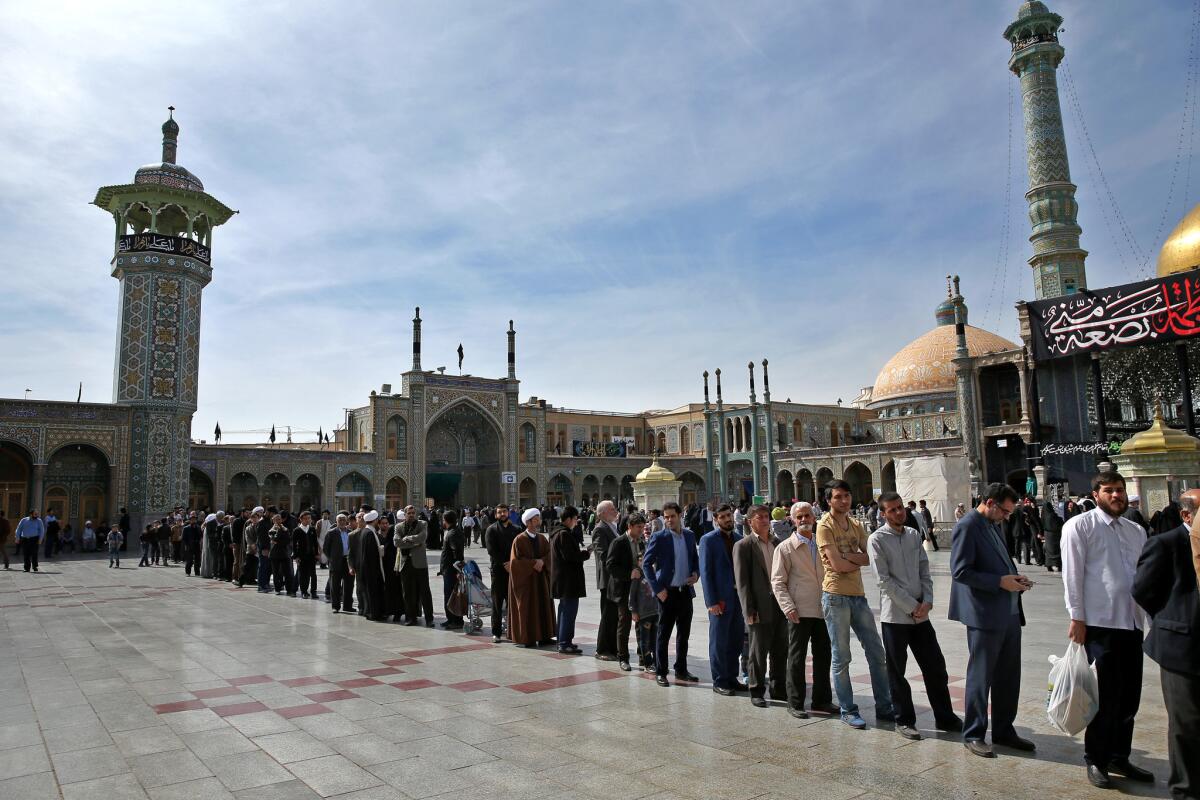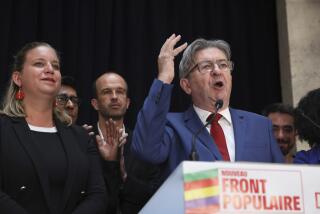Reformers and moderates romp in Tehran as Iran election gauges popularity of nuclear deal

Iranians stand in line outside a polling station during the parliamentary and Experts Assembly elections in Qom on Friday.
Reporting from Tehran — Reformists and moderates swept all 30 parliamentary seats in the Iranian capital, according to unofficial election results announced Sunday, marking a resounding vote of confidence for President Hassan Rouhani.
While state television reported that conservative candidates were leading in other parts of Iran, the clean sweep in Tehran – where lawmakers hold outsize influence in the 290-seat parliament – was seen as an endorsement of the deal Rouhani sealed with six world powers last year to curb Iran’s nuclear program.
Join the conversation on Facebook >>
Nasim, a news agency loyal to hard-liners, acknowledged that Rouhani’s moderate and reformist allies, who favor better relations with the West, won all 30 seats in Tehran. A leading hard-liner, Gholam Ali Hadaddad Adel, was in 31st place, according to reports.
A high voter turnout exceeding 60% of Iran’s 55 million eligible voters appeared to propel moderates and reformists to their best electoral showing since 2004. Final results were expected Monday.
Hard-liners who oppose the nuclear deal also suffered significant setbacks in a parallel election taking place for the Assembly of Experts, an 88-member panel of Islamic jurists who are supposed to select the clerical supreme leader, the most powerful figure in Iran’s hybrid political system.
Two of the most conservative members of the assembly, Mohammad Yazdi and Mesbah Yazdi, were not reelected to their posts following a social-media campaign to oust hard-liners. The assembly election is being closely watched because its members could choose the successor to the current supreme leader, Ayatollah Ali Khamenei, who is 77 and in declining health.
Friday’s election was seen as a referendum on the nuclear agreement, which prompted the United States and other countries to lift harsh economic sanctions that had left Iran increasingly isolated from the Western world. Rouhani was elected in 2013 on promises to resolve the nuclear dispute, repair ties with the West, improve the economy and expand social freedoms.
Hamid Reza Taraghi, a prominent conservative lawmaker, predicted that the pro-democracy reformists would hold 25% of seats in the new parliament, a major turnaround. The group has been all but shut out of the legislature since boycotting the 2004 parliamentary elections after many of their candidates were disqualified by the hard-line Guardian Council.
Moderates who have allied with the reformists in this election to make up the pro-Rouhani “List of Hope” would win about 15% of seats, Taraghi said. About 50 seats were expected to require runoff elections.
Together that would give Rouhani a significant bloc of support in parliament, which until now has thwarted his efforts to introduce political reforms and more social freedoms.
But the coalition could prove fragile under pressure from conservatives, who were on track to win a roughly equal number of seats, and hard-liners who still control most of the reins of power in the Islamic republic.
“They will be divided and in disarray and will fail to be effective,” Taraghi said of the pro-Rouhani group.
Analysts said Rouhani and his allies need to manage the expectations of supporters impatient for rapid change in a country in which half of the electorate is younger than 35. Buoyed by their apparent electoral success, reformists renewed calls Sunday for the release of former presidential candidates Mir Hossein Mousavi and Mehdi Karrubi, who are under house arrest.
Since taking office, Rouhani has been unable to secure the release of political prisoners, a sign of hard-liners’ enduring clout.
“As experience indicates, the reformists usually are good at raising expectations to woo votes from middle-class people but are not good at all in meeting and managing the expectations after the elections,” said Farshad Qourbanpour, a political analyst.
Mostaghim is a special correspondent. Times staff writer Bengali reported from Mumbai, India.
ALSO
Twice-escaped ‘El Chapo’ Guzman says he’ll do time in U.S.-- as long as it’s in medium security
Why Silicon Valley is betting big on India
A delicate truce brings relative calm to parts of Syria despite breaches
More to Read
Sign up for Essential California
The most important California stories and recommendations in your inbox every morning.
You may occasionally receive promotional content from the Los Angeles Times.











